The Outpost: finding refuge.
“And eventually the child grows up…. All these beliefs, unmet needs, emotions, and behaviors remain. All this unprocessed rage, hurt, sadness, loneliness, betrayal, and fear is still there. Sometimes they even become worse because of other experiences and relationships that the person encounters along the way. The hurt tends to pile up, the beliefs tend to become stronger, the behaviors tend to become more automatic, more ‘natural,’ and more unconscious.” — Darius Cikanavicius, author of Human Development and Trauma (on Amazon: http://a.co/fYNKWne)
I love to use analogies to help illustrate big or complex ideas.
Creating a visual picture of something similar in life, can help to reframe unique or painful life experiences into relatable understanding.
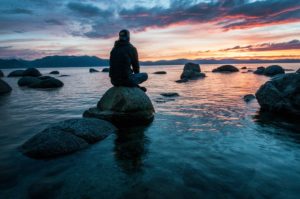
It is especially helpful when relating to trauma, grief or addictions.
Recently, I have found myself illustrating more through imagining outdoor survival skills. For many adults, childhood may have felt like being dropped off in the mountains or wilderness, abandoned there, and expected to figure out, on our own, how to survive. And survive we do.
Along the way, we develop survival strategies that through time and practice, become automatic, even instinctual.
We do whatever we can to survive overwhelming scenarios and the injuries and pain that come with it. Down the road when these unhealed injuries are bumped, pain is awakened like being struck by a hot poker.
Our emergency response system activates.
Almost like in a state of hypnosis, we go through our rituals, habits or reactions to alleviate the pain. While the pain may cool, we may find ourselves no further along in the journey and the wounds remain unchanged.
Unlike physical injuries, emotional injuries are unseen.
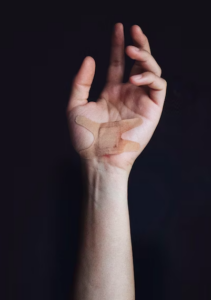
It’s more like they are stored: in our body, in our nervous system, in our memories, in our heart, in our beliefs and even in our identity.
Without any guidance or instruction, we do the best with what we know and create ways to deal with: loss and grief, abuse, violence, shame, fear, rejection or overwhelming stress.
We become wired to react quickly to anything similar that may present in future.
In different environments however, these instincts may become detrimental to our survival. They were once necessary, but now they may be a hindrance to having secure, safe, intimate relationships or even in furthering the vision we have for our lives.
Carrying untreated injuries and the hidden infections within, condition us to distorted messages about our worth. The pain that comes with it cycles us into our survivalistic ways to alleviate it. We even justify the means in an attempt to falsely feel ok. This pain cycle can unfold very quickly since it has been installed, through many repetitions, into the most primitive parts of our nervous system. Trigger, pain, act out, justify, false normal.
The above quote depicts when we have traveled far too long in the wilderness on our own. It leaves us vulnerable to the next big stressor that we thought we were prepared for, yet painfully discover we are ill equipped. When life brings more pain than we are accustomed to. If we haven’t been there before, we get overwhelmed in a new way. We can experience true cognitive dissonance.
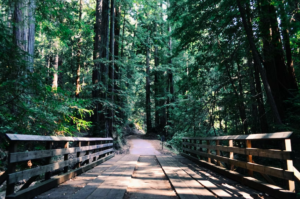
It may feel like running into a wall and we think “I have no idea how this can ever get better.” The automatic strategies no longer work and even become detrimental to the relationships that mean the most to us. It is usually here, when we begin to discover, that we are in fact wounded and urgently need help.
Becoming more alerted to the injuries we have carried all our life, is its own kind of distress. We may: feel the pain more loudly now than we have experienced before, feel like we are spiraling out of control, feel more frozen in decision making or find ourselves withdrawing from relationships, work or responsibilities. This discovery can be enough to motivate us to seek help, because there’s no way we can live that way.
Healing begins with becoming aware that the wounds even exist.
We must also experience our old, familiar, instinctual strategies no longer working. This awareness tends to create a stronger desire for learning other ways of dealing with the pain, tending to wounds: the shame, the fears, the grief and the infected messages about our worth. It can awaken desire to embark on a new journey of healing, exploration and restoration. That new journey includes suffering, but if resetting a bone means we can walk straight again, then we may be more open to experiencing a pain we haven’t before. Healing is hard work, and painful, yet it’s a different kind of pain.
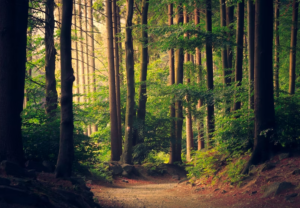
The longer we have had to use those ways the more daunting and impossible change may seem. However, it’s been my experience that no matter how far a person has traveled with a particular set of skills, we can always learn new ones and heal the deepest of injuries. We can discover that we do not need to throw away all the old skills, rather adjust them with new understanding. It begins with one step. And then another.
I believe a therapist’s role is to be more of a guide in a person’s journey.
A therapist can help identify old cycles. Having someone walk beside us, during our healing journey, is nearly a requirement for creating new cycles. A new familiar for recognizing and treating deep emotional injuries and pain. That new cycle needs practice and support. It also needs a new rhythm of awareness, resistance to the old ways and intentional action. Then repeat.
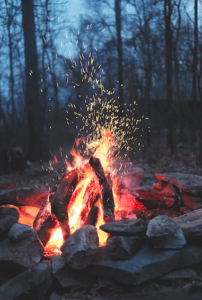
With support and guidance we can create new familiar habits: new ways to soothe ourselves, new ways to self regulate, new ways to voice and get our needs met. We can create intentional ways to cool our nervous system and develop new pathways in our brain. We can create and experience loving and true messages about our worth. We can create new ways to tend to inexplicable pain while allowing us to have authentic, vulnerable and intimate relationships.
Whether you are struggling with grief, trauma, depression, anxiety or addictions there is support that can help to fine tune your skills to move from surviving to thriving. If you are finding that your survival skills are no longer working it can become a great opportunity to risk and discover new methods.
As a therapist I desire to create an Outpost along the way. A place where you can feel safe, process about the journey, be understood and learn and develop new skills. Healing old injuries is painful and hard work. 
However, avoiding them will keep us where we are and we may miss out on some of the best life has to offer.
There are countless mountain tops to experience in life and we all need an outpost, especially in the valleys, to experience relief, fine tune our skills and plot out new points on the map.


